COVER- Person of the Year: Joel Salatin's salad days
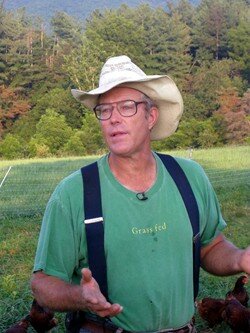 Normal 0 MicrosoftInternetExplorer4 Normal 0 MicrosoftInternetExplorer4
Normal 0 MicrosoftInternetExplorer4 Normal 0 MicrosoftInternetExplorer4 "The amount of licenses, paperwork, reporting, and warrantless inspections given to people who have a track record of anti-natural is unprecedented."
PHOTO BY DAVE MCNAIR
It’s been quite a year for Joel Salatin. The Shenandoah Valley farmer starred as himself in two popular food documentary films and received a $100,000 award from the Heinz Family Foundation for his creative, eco-friendly practices.
“The big corporate farms can no longer tell us that pollution will always come with farming,” said Foundation leader Teresa Heinz. “Mr. Salatin’s work shows us that is not true, because on his lands, farming is no longer part of the problem; it is part of the solution to a better environment.”
While Salatin's solutions have long been known in Central Virginia, he received a bumper crop of publicity in Michael Pollan’s 2006 best seller, The Omnivore’s Dilemma. In turn, the producers of the documentaries Food, Inc. and Fresh helped make him America’s most famous farmer since George Washington Carver.
"I first experienced him in the 1980s when he premiered his idea of an 'eggmobile' at the first [Virginia Association for Biological Farming] conference," says Tanya Denckla Cobb, associate director of UVA's Institute for Environmental Negotiation. "He was a firebrand and electrified the crowd, receiving a standing ovation. Nobody had ever seen the likes of him. Now the rest of the world is starting to catch up."
46 restaurants and stores
Since Salatin declines to ship his food and discourages everyone else from buying food from sources more than 100 miles from home, his success has become Central Virginia's good fortune.
Of the 46 restaurants and food stores in Virginia where Salatin’s salad bar beef, pork, chickens, turkeys, and rabbits are available, half are in the Charlottesville area. Last year, gourmet burrito chain Chipotle, which has 900 locations in the U.S. and Canada, chose its Charlottesville store to begin sourcing local pork because of its proximity to Salatin’s Polyface Farms. Today, 100 percent of the Charlottesville Chipotle’s pork is supplied by Polyface.
According to the 53-year-old Salatin, it all started with his late father. William Salatin, an accountant, had tried to start a sustainable farm in Venezuela in the 1950s but lost the land amid that nation’s turmoil as it transitioned from a dictatorship to a democracy. The family then returned to the United States and started over, buying some dirt-cheap land in Swoope.
His parents were early adapters of grass-feeding, controlled grazing, movable structures, and many other
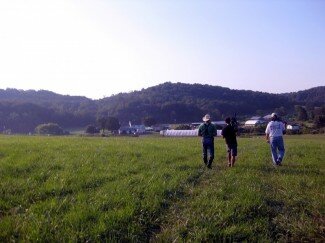 "I may not be the richest guy in the world," says Salatin, "but man, what an office." PHOTO BY DAVE MCNAIR
"I may not be the richest guy in the world," says Salatin, "but man, what an office." PHOTO BY DAVE MCNAIR innovative practices that Salatin gets applause for using. Salatin admits he tried his hand as a newspaper reporter, but in 1982, he agreed to take over his parents' 550-acre farm, along with their innovative philosophies.
While it was rough going in the beginning, his plan to sell directly to consumers started to yield a modest profit. Then journalists began to discover what he was doing.
"Most farmers are a lot more timid than I am," explains Salatin, who unapologetically credits his "dramatic and verbal charisma” for his high profile. “There’s a stereotype of farmers as hicks, but a lot of farmers are hicks.”
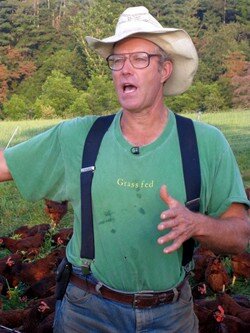 "Why is local food so expensive?" says Salatin. "Because we have suffocating regulations." PHOTO BY DAVE MCNAIR
"Why is local food so expensive?" says Salatin. "Because we have suffocating regulations." PHOTO BY DAVE MCNAIR Salatin has become the Sabato of the soil–- a veritable quote machine, although he sometimes veers into Tom Wolfe's terrain. For example, he famously refers to himself as a “Christian-libertarian-environmentalist-capitalist-lunatic farmer," a description that finds its way into nearly every story about him. He’s also the author of six books, including his most recent, Everything I Want to Do is Illegal: War Stories from the Local Food Front. And many of his views and comments sound rehearsed–- or at least as recycled as the chicken feathers and entrails he so famously repurposes as compost.
"I may not be the richest guy in the world," says Salatin, whose operation, including fees from speaking engagements and book sales, now clears about $150,000 a year, "but man, what an office."
Earlier this year, the Hook caught up with our 2009 Person of the Year for a glimpse of the firebrand, as well as the food that has made him famous.
A journey to Swoope
After navigating a jigsaw puzzle of country roads just southwest of Staunton, a reporter’s truck rattles as it crosses a cattle bridge and past a small sign that announces Polyface Farms, “farm of many faces.” The truck kicks up dust as it heads down a dirt road toward a ramshackle arrangement of outbuildings and trailers surrounding a modest white farm house. It’s 6am, and the rising sun has yet to burn away the morning mist.
In the middle of a field and around a dilapidated tin shack on wheels that looks like a prop from the Beverly Hillbillies, a flock of grey hens have gathered; but there are no other animals in sight. Fencing is makeshift with crooked posts tensioning a single wire running across the top. A boy drives by on a four-wheeler, and we flag him down to ask for the boss.
“He might be down with the hogs,” says the kid before driving off.
No signs of hogs. Closer to the main house, greenhouses and equipment sheds look like they haven’t seen action in decades. Anyone expecting bright red barns, miles of white wooden fencing, and gleaming tractors would be disappointed. All is dirty.
That is, until a dozen tall, attractive college-aged men and women appear around the corner of building, wearing knee-high rubber boots–- like a master race raised on raw milk and grass-fed beef, or models in a farm-themed fashion shoot for Abercrombie and Fitch.
"We're interns," explains a young woman whose blond hair shines like fresh straw falling out from under her cap as her companions point to a distant hillside where a man in a straw hat is standing among a flock of chickens in front of a film crew.
America has over 450,000 family farms, but Polyface may be the only one led by someone who is as comfortable raising chickens as being interviewed. Or both. When a reporter finally reaches the top of the hill, the man in the "Grass fed" t-shirt is waxing eloquent for another documentary. Farmageddon, say the filmmakers, who’ve positioned Salatin to face the rising sun, will explore the way over-regulation is allegedly destroying small farms.
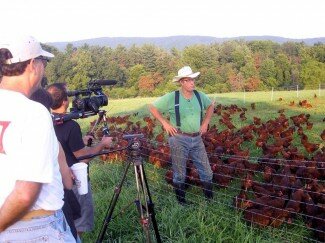 Salatin is interviewed for yet another food documentary. This one will be called Farmageddon. PHOTO BY BOB DAVE MCNAIR
Salatin is interviewed for yet another food documentary. This one will be called Farmageddon. PHOTO BY BOB DAVE MCNAIR "I want to see dancing earthworms, feed the world, and heal people," Salatin tells the camera, surrounded by his chickens, one of whom, like a house cat, rests in his arms. "The more people we get out here to see it, to feel it, the more converts we'll get."
Apparently, there’s no shortage of believers. During a recent open house, Salatin mentions later, 1,600 people showed up.
Immortalized
In 2005, before Pollan wrote of Salatin's “dangerous pileup of modifiers,” a New York Times Magazine feature introduced the world to some of the “Salatinisms” which, if not quite as famous as Yogi Berra's "Yogisms," have least given foodies something to chuckle about.
While the Times called him the "high priest of the pasture," he's clearly more of a southern preacher. In his trademark straw hat and glasses, he refers to his farm as a "healing ministry" and characterizes his grievances with corporate food production and government bureaucracies as a battle between good and evil.
For example, Salatin refers to local Health Department inspectors as "food Nazis" and suggests that the average American's detached relationship to food production could lead to the dehumanization of society.
"If you told the Germans in 1930 that within a decade or so they would exterminate six million Jews, nobody would have believed you," he says. "I think we are in the same kind of times right now."
Whoa!
In particular, Salatin says he's concerned about several food safety bills moving through Congress. Although they're designed to address national concerns about contamination and the ills of factory farms whose reputation has suffered under growing waste pools, cruel confinement cages, and the recent salmonella outbreak in peanuts from a Georgia plant that claimed at least seven lives, Salatin thinks they will hurt small farmers.
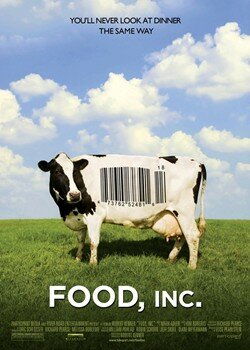 "Fresh was more positive, and the cinemetography better, says Salatin the film critic. "They came for two-day stretches at different times of the year. The Food Inc. folks came in and did everything in one day. Food Inc. is more in your face, makes you not want to eat anything.". FOOD INC. MOVIE POSTER
"Fresh was more positive, and the cinemetography better, says Salatin the film critic. "They came for two-day stretches at different times of the year. The Food Inc. folks came in and did everything in one day. Food Inc. is more in your face, makes you not want to eat anything.". FOOD INC. MOVIE POSTER "I think they will destroy local food systems and small farms," he says. "Here is all you have to know: Monsanto is for it. Anything they are for cannot be helpful to anything honest."
So, if that happens, how does he hope to survive?
"Don't know. Maybe in jail," he says. "Many of us around the country are prepared to not comply."
Nelson County farmers Richard Bean and Jean Rinaldi know something about that. In 2007, the couple, both in their 60s, were handcuffed and arrested by state agriculture agents. Ostensibly, their crime was feloniously defrauding their customers with incorrect labels. Supporters contended, however, that they drew official ire for butchering hogs on their small farm. Bean, a butcher by trade, had wanted to avoid the expense of hauling his pigs to a licensed slaughterhouse, which can consume eight hours on the road and cost as much as $300 a pig.
(Despite expressing a willingness to go to jail, Bean eventually began sending his hogs to slaughter in Harrisonburg, pleaded to no-jail, no-fine misdemeanor counts in Charlottesville and Nelson, and proudly notes that he's doing "more business than ever.")
As Salatin points out, most food production laws were designed with industrial farm operations in mind. For instance, Salatin must transport his own hogs to be butchered, and farm regulations require him to spend $10,000 a year in workers compensation insurance to have a "live animal hauler." Regulations also prohibit workers from working with both cows and chickens, a blow to Salatin's trademark rotation-style farming. And don't get him started on raw milk, a valuable food available to all cow-raising farmers, but something that is illegal to buy and sell in Virginia.
"Why is local food so expensive?" he says. "Because we have suffocating regulations."
Germs v. immune systems
But what about food safety? Aren't regulations in place to protect the consumer?
Salatin suggests that a close relationship between farmer and consumer creates safety. For instance, Bean's local pork is popular because people have savored it and come to trust Double H Farm. And unlike a mass recall that requires destruction of meat in multiple states, any problems with Double H pork might be more easily traced.
"I think my food is safe," says Salatin. "But according to the poultry industry, the way I raise chickens is bio-terrorism, because red-winged blackbirds commiserate with my chickens and will carry their diseases to the Tyson chicken factory."
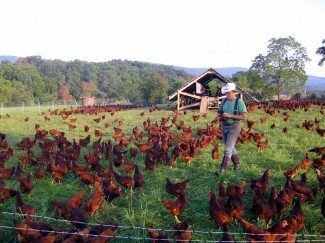 "According to the poultry industry, the way I raise chickens is bio-terrorism," says Salatin. PHOTO BY DAVE MCNAIR
"According to the poultry industry, the way I raise chickens is bio-terrorism," says Salatin. PHOTO BY DAVE MCNAIROver a hundred years later, says Salatin, we're still fighting the argument between Louis Pasteur and Antoine Beauchamp. Say what?
“Pasteur advanced the germ theory–- we're just victims of these bad germs out there doing us in," says Salatin. "Beauchamp advanced the terrain theory–- germs only enter when our natural defenses are compromised.
"American food policy in our western reductionist disconnected fragmented systematized culture adheres to the germ theory," he says. "But naturopathy, homeopathy, massage, acupuncture, humane animal activists, etc. all adhere to the terrain theory–- that disease is a product of a compromised immune system.”
For example, concentrated animal feeding operations on factory farms, he says, create a perfect terrain for germs to get a foothold, whether it's viruses, parasites, or bacteria.
“Stress, overcrowding, fecal particulate, unsanitary conditions, lack of exercise, lack of salad, and nutrient deficiency all compromise the immune system so bad guys can get in,” he says.
So what creates better immunities? “All the opposites of that list, which is exactly what Polyface and other like-minded farmers do,” he explains.
“In all their discussions about food safety and pathogens, the USDA never questions the bedrock assumption that the terrible conditions listed above are the best way, or most efficient way, to produce food,” says Salatin. “So they develop irradiation, chlorination, parasiticides, fumigants, ammonia baths, antibiotics, and other toxic procedures to kill germs rather than changing the production model to create a better immune program.”
"Everything in the food industry is moving toward sterility," says Salatin. "That’s where all this is headed."
Ironically, for small local farmers like Bean, Rinaldi, and Salatin, who sell food straight from the source, some of their strongest critics come from the organic food industry. In fact, Salatin says organic food lobbyists came after him for using the tag line "Beyond Organic," eventually forcing him to stop using it.
"Maybe it's just as well for it all to pass to create a local farmer martyr class," he says. "Perhaps that would bring all this to a head, and the country would bring back some sanity and clip the wings of the bureaucrat minions doing Monsanto's bidding. So I'm not pessimistic, just trying to prepare."
Asked if he would be willing to become a martyr for the local food movement should he do something illegal and wind up in jail, he doesn’t hesitate.
“Absolutely,” he says.
Salatin's no saint
Of course, it’s not easy finding Salatin critics, especially in the local food movement, where most articles about him border on idolatry. But they're out there. Casey and Katie Kulla, who own a small produce farm in Oregon called Oakhill Organics, haven’t been shy about their beefs with the famous farmer on their blog. However, when asked to comment for this story, the couple declined, saying they didn’t want to be divisive.
You wouldn’t know it reading their blog.
“Salatin is more and more gaining a reputation among small farmers as being a notorious 'talker,’" wrote the Kullas last year. “His books tend to dangerously oversimplify livestock production, and his claims about his own farm seem over-inflated when you realize that he compromises too. For example, as [Michael] Pollan points out [in The Ominvore's Dilemma], Salatin buys corn sprayed with atrazine, a substance prohibited by organic standards and decried by Pollan elsewhere in Omnivore. In Pollan’s comparisons of the two farms, I kept asking: "Where are all the other farmers?'”
They also took issue with Salatin's use of "beyond organic" and the way Pollan embraced the term in his book.
"It's a loaded term within alternative ag right now as certified and non-certified farmers are starting to feel tension and figure out how we all plan to get along even when we make different choices," they write. " Using the phrase casually and without analysis was a bit na¯ve."
Not hungry
Salatin gestures toward his chickens, and toward the entire farm. “You don’t have to be a rocket scientist to know that this is the way it should be,” he says.
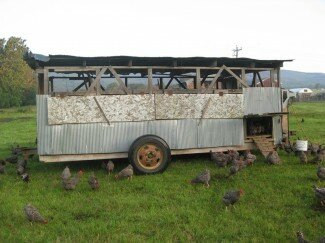 Salatin's famous "egg mobile" was semi-retired for his new "Feathernet" system for raising chickens. PHOTO BY DAVE MCNAIR
Salatin's famous "egg mobile" was semi-retired for his new "Feathernet" system for raising chickens. PHOTO BY DAVE MCNAIR Without missing a beat, Salatin turns his attention to more practical matters, like explaining how his new system for tending his chickens works. He stopped using his famous “eggmobile,” the shack on wheels near the farm’s entrance, in favor of a system he calls a “Feathernet.” It’s basically a hen house built on skids and surrounded by a 450-foot circle of electrified netting. To reduce labor, the system also features a separate and mobile self-feeding and watering system, supplying enough of both to the chickens for three weeks.
There are about 1,000 chickens in the mobile compound, perched high on a hill above Salatin's house, offering a beautiful view of his farm and the mountains as the sun climbs. But even the location has a purpose: keeping them close allows Salatin's family to watch for hawks and other birds of prey.
The whole set-up is moved to a fresh circle of pasture every three days, but not before the cattle are allowed to graze and shorten the grass for the chickens. That's all fine, say some critics, but how do you expect to feed 300 million Americans– especially when Polyface chicken can cost more than twice the price of supermarket birds?
“We can feed the world this way,” claims Salatin, noting that factory farms don't include the cost of filthy drinking water, ruined streams, air pollution, and inhumanity to God's creatures.
“The industrialists measure only one component when comparing with natural systems, rather than the aggregate production of all the pieces combined. It’s the stacking effect that generates greater production per acre. One of the most notable is rice. Indigenous systems produce fish, ducks, eggs, greens, and rice in a paddy. Industrial systems using chemicals produce only rice. While the scientists say, 'See how much more rice we're producing,' the reality is that the total production of an integrated system is much higher than rice alone.”
We walk over to an adjacent field, where a flock of big white turkeys are kept in another mobile compound, out of sight of the house but guarded by three geese that Salatin says will attack any hawk that dares touch down.
 "If we continue to look at these beautiful turkeys the way we do, just as a protoplasmic mass that can be put into any food product," he says, “it won’t be long until we look at people, and especially people from other cultures, the same way."
"If we continue to look at these beautiful turkeys the way we do, just as a protoplasmic mass that can be put into any food product," he says, “it won’t be long until we look at people, and especially people from other cultures, the same way."
Walking away from the turkeys, a reporter and the film crew in tow, he says, almost casually, "This is the first time in human history where people can have no real connection, or relationship, with their natural ecology."
It's an observation that hits like a thunderbolt. The reason a trip to a real farm can be so jarring is that it challenges the way we are used to confronting our food, which typically involves walking past rows of brightly packaged jars and boxes–- often featuring faces of cartoon characters–- or hovering over displays of neatly packaged meats, without ever thinking about how they got there.
"It must be sad when it comes time to slaughter them," says Boston-based film producer Paul Dewey, who was clearly moved by Salatin's speech about his beautiful turkeys.
"Nooooo, that's payday," says Salatin. "Are you sad when you get a bonus?"
On the way back to the house, Salatin points out some mulberry trees behind a shed where his baby chicks are raised, and we eat the sweet and sour berries off the branches.
"Most people don't know that mulberry trees bear fruit for at least 100 days," he says. "There's so much you can do with mulberries."
In the house, Salatin's wife, Teresa, has made us breakfast.
"This is gonna be a real farm breakfast," says Salatin. "You won't be hungry all day."
Indeed, we're served a helping of Salatin's eggs, scrambled, three of his sausage links, a potentially illegal glass of raw milk from a nearby farm, and some apple cider from a local orchard.
The Lord, of course, is thanked for the food we're about to receive, but it's his servant in Swoope we have to thank for getting it onto our plates in its purest form.
And he's right about the breakfast. Despite consuming modest portions, the reporter didn't feel hungry all day.
10 comments
Raw milk....make up your own mind:
What the government thinks:
http://www.fda.gov/Food/FoodSafety/Product-SpecificInformation/MilkSafet...
A new book called the Raw Milk Revolution, with a forward by Salatin:
http://books.google.com/books?id=w8LmQ4ujsPcC&dq=salatin+on+raw+milk&pri...
Joel was my debate coach in high school back in the late '80s. He is an incredible guy, and very passionate about his work. I've lost touch with him over the years, but the next time I'm "back home" I'll have to give him a call.
Yes, there are farmers that can supply wholesome meat, poultry, vegetables and dairy in every state. And in every state, laws are threatening to put these small farmers out of business, as Joel says. We are petitioning for exemption from industrial farming practice regulations for small local farms in Maine this week.
So please folk, be informed and support local small farms with your purchases and your petitions.
A great resource for finding food from local farms is www.localharvest.org. There are also lots of sustainable agriculture and organic farming groups around the country so you can find the groups in your state and they will have a list of farmer members many of whom will sell from the farm or at farmers markets. Another way to find local farms is Slow Food. there are many Slow Food chapters accross the country and many have directories of local farms. In addition keep in mind that one of the reasons that local food is usually safer and healthier is that you can go to the farm and see for yourself how your food is raised and decide for yourself if that meets your criteria for health, safety, humane handling, environmental responsibility etc.
Salatin was featured in "Grit" recently. What a re-innovator and what a very interesting and inspiring person Salatin is! Our federal, state and even more so local governments are limiting peoples freedom to go back to the soil with permits, fees, more permits, building and architectural requirements along with water and drainage paperwork that requires engineers heavy soft costs that eat up PROFIT, eat up all start up or first year survival fund. Oops, profit is a bad word to Albemarle socialist. This prevents people from expanding our economy both locally and state wide. When are voters going to revolt and bring in leaders who are going to short cut and support with cost-less permits and fees for small farmers, truck farmers (produce), chicken ranchers who are feeding us all in a healthy manner.
A nice job on in-depth reporting on the Polyface story. I was disappointed that the reporter missed some important aspects of the story, however. The article notes that "Salatin must transport his own hogs to be butchered", but fails to report that he transports them up to a USDA-inspected abbatoir in Harrisonburg of which Joel is part owner - True & Essential Meats (aka T&E Meats). And when Richard Bean sends his hogs to slaughter, that is where he sends them as well, not just to "Harrisonburg", as the article says. All of those Charlottesville restaurants mentioned in the article, including Chipotle, rely on T&E's butchers to provide them with a top quality product. When we talk about rebuilding local food systems, we have to understand and support the whole system, not just the farmer. It's great to have heroes, but the devil is still in the details.
Joe Cloud
Co-Owner/Managing Partner
Salatin & Cloud, LC
(dba True & Essential Meats)
damon, I sure don't want McDonough having anything to do with my local government. Talk about some hubris! Did you see the Fast Company article "Green Guru Gone Wrong: William McDonough?" It's available on line and you ought to read it. It's a nice counterpoint to the hype machine.
Two thumbs up to Joel S. though!! Let's hope success doesn't go to his head.
Re Raw Milk - there is another side to the equation:
http://www.marlerblog.com/2009/05/articles/legal-cases/the-alexandre-eco...
http://www.marlerblog.com/2009/12/articles/legal-cases/2008-raw-goat-mil...
http://www.marlerblog.com/2009/12/articles/legal-cases/whole-foods-and-t...
http://www.marlerblog.com/2009/12/articles/client-videos/e-coli-o157h7-o...
Would that Charlottesville's world class city hubris dissolve into the service of combining Joel Salatin and William McDonough into some form of workable, ongoing experimental eco-capitalist-socialist blend that serves to try a new way. A way that seeks self sufficiency, don't tread on me independence in the service of the forms of planning, farming, manufacturing, and building that deserve to survive and provide seed crystals for the rebuilding out of the rubble of the stockjobbing monstrosity that beckons to bring the world to ruin and turn us all into cheerful robots.
While I'm a big supporter of Salatin. Remember to seek out small farmers to purchase meat. Polyface is doing quite well financially. There are other small farmers who can supply a perfectly good chicken and need your support.